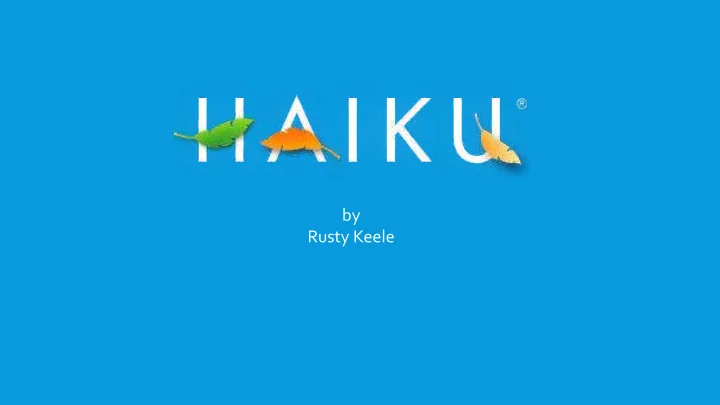

A FREE OPERATING SYSTEM DESIGNED SPECIFICALLY FOR PERSONAL COMPUTING by Rusty Keele
THE PLAN FOR TODAY A brief introduction A short history lesson A show-and-tell overview Some resources A philosophical discussion
INTRODUCTION
ABOUT ME • BA in CS • Work for UEN • Started using computers in 1982 • I’ve used many operating systems… • I am not a salesman for Haiku!
WHAT IS HAIKU? A free, open source, operating system Designed specifically for personal computing Based on the now discontinued BeOS
ANYONE? Has anyone here ever used BeOS or Haiku?
A HISTORY LESSON
A HISTORY OF BEOS Jean-Louis Gassée An executive at Apple in the 1980s Ousted from Apple in 1990 Started Be Inc. in 1991
BE, INC. Built BeBox hardware and BeOS to run on it First release was in 1995 Only about 2,000 BeBoxes sold from late 1995 to early 1997 Stopped making hardware, and focused on BeOS
APPLE & BE Apple tried to buy BeOS in 1996, as a replacement for MacOS But Be held out for more money... ...So Apple purchased Steve Job's NeXT instead!
THE END OF BEOS BeOS was then ported to some Macintosh clones and the x86 architecture… …But never really gained much traction on either platform Last release of BeOS was R5 in 2000 Then the company was bought by Palm
BEOS WAS LOVED! (BY SOME) It gained a small following of loyal fans Like science fiction author Neal Stephenson In the Beginning was the Command Line - his article about operating systems You can read it for free at http://www.cryptonomicon.com/begi nning.html
OPENBEOS OpenBeOS project started in 2001 Goals: Support the BeOS user community by creating an open-source, backward- compatible replacement for BeOS To be source and binary compatible with BeOS
HAIKU In 2004 OpenBeOS changed its name to Haiku, after receiving a trademark infringement notification from Palm September 2009: Haiku R1 Alpha 1 is released Latest version: R1/Alpha 4.1, released in November 2012
WHY DO RELEASES TAKE SO LONG? Raise money and hire some programmers Strict about their coding and interface guidelines Careful attention makes for slow progress… …But relatively stable and bug free releases
WHY IS IT CALLED HAIKU? Because of NetPositive's haiku error messages: " Login incorrect. " These three are certain: Only perfect spellers may Death, taxes, and site not found. Enter this system. You, victim of one." See them all at http://8325.org/haiku/
AN OVERVIEW OF HAIKU
SYSTEM REQUIREMENTS Haiku currently only works on x86 systems 32 bit version only - no 64 bit system Minimum memory required: 128 MB CPU: Pentium II 400 MHz Drive space: 700 MB
A HAIKU DEMO A VirtualBox Demonstration…
UNDER THE HOOD FEATURES Specific focus on personal computing (not multi-user) Custom kernel designed for responsiveness Fully threaded design for great efficiency with multi-processor/core CPUs Rich OO API for faster development Database-like file system (BFS) with support for indexed metadata Unified, cohesive interface
IF YOU ARE INTERESTED Resources for Haiku
THE WEBSITE www.haiku-os.org Download the OS Learn about the project Keep up on the latest news Blogs, forums, articles, tickets, etc.
LEARNING AND GETTING HELP Included documentation Welcome : get you started using the OS, and points you to other resources Haiku User Guide : Details the GUI, the file system, the file explorer, the Deskbar, shortcuts, etc. The BeBook : Details the programming API for BeOS/Haiku The website Community > Help and Support
GETTING INVOLVED Community > Getting Involved Developing for Haiku (in C++) Books: Two programming books by Jon Yoder Can download them for free on the Haiku website, under Development Donating money
WHY?
WHY SHOULD WE CARE ABOUT (OR USE) OLD OPERATING SYSTEMS? What do you think? How many of you are not using the absolute latest version of your OS right now? So, technically, you are using an old Operating System! Why haven't you updated? Money, time, hassle, hardware, bandwidth…
WHY WE SHOULD CARE ABOUT OLD OPERATING SYSTEMS An OS for older computers Run legacy applications and older games Collectors / historical reasons Useful computers = less landfill!
WHY WE SHOULD CARE ABOUT OLD OPERATING SYSTEMS Stop the Rat Race Do we really need all the "features" of newer Operating Systems? If it ain't broke, don't fix it! Privacy and tracking concerns Fewer hassles
WHY WE SHOULD CARE ABOUT OLD OPERATING SYSTEMS To provide variety in the world Fun! Learn about Operating Systems Get involved developing an OS (with less people than Linux!) Provide alternatives to the major Operating Systems Haiku version 1.0 could lead to development for newer machines
THE END rusty.keele@gmail.com Slides at c64sets.com/slides Questions or comments?
Recommend
More recommend